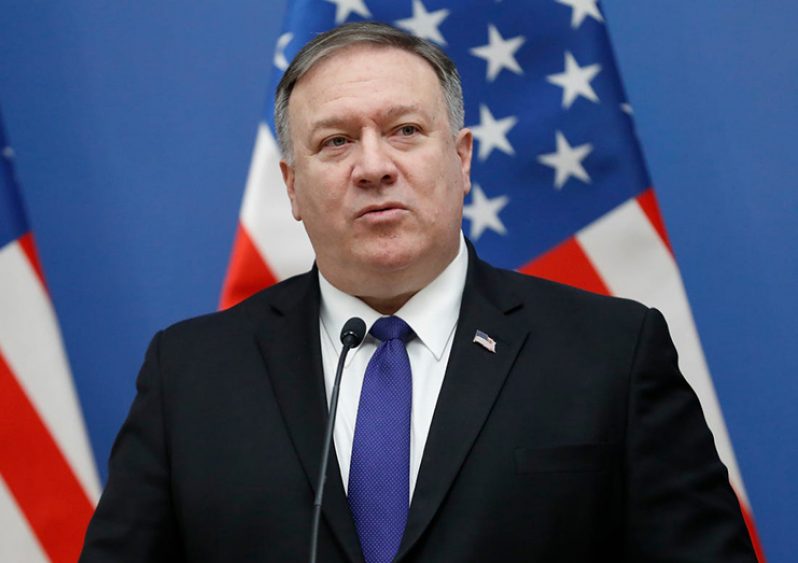U.S. Secretary of State Michael Pompeo arrives in Guyana today on a two-day visit. During this time he will lead a U.S. delegation in meetings with President Dr Irfaan Ali and Minister of Foreign Affairs and International Cooperation, Hugh Hilton Todd.
The two sides will conclude agreements aimed at strengthening the Guyana/U.S. cooperation programme.
Secretary Pompeo is also scheduled to meet with Secretary-General of the Caribbean Community, Ambassador Irwin LaRocque.
According to the Foreign Affairs Ministry, Guyana’s relations with the U.S. have been based over the years on mutual respect and a desire to cooperate in several areas that would be of benefit to the people of both countries.
The basis of that relationship has not changed with respect to the sovereign decisions taken by each country. Secretary Pompeo’s visit will, therefore, provide a timely boost to the further deepening of relations between the two hemispheric neighbours.
“While the United States of America has always been an important development partner of Guyana’s, Secretary Pompeo’s intended visit following the administration’s recent assumption to [sic] office, is an indication of Washington’s confidence in President’s Ali’s government. The visit will further advance relations between Guyana and the United States, as we work to explore more extensive relationships with all our friends in the international community,” the Foreign Affairs Ministry said.
The U.S. plays a key role in promoting and strengthening democracy in Guyana and Secretary of State Pompeo was instrumental in ensuring a democratic transition of government in Guyana, following attempts by the APNU+AFC coalition to derail democracy in Guyana in the recent general and regional elections.
The U.S. is also a key partner in development. According to the U.S. Department of State, the U.S. policy toward Guyana seeks to develop robust and sustainable democratic institutions, laws, and political practices; support economic growth and development; promote an active, organised, and empowered civil society; and promote stability and security.
Beginning in the late 1980s, Guyana sought to improve relations with the U.S. as part of a decision to shift toward political non-alignment, moving from state socialism and one-party control to a market economy and greater freedom of the press and assembly. This shift, closer security cooperation, and expanding trade and investment have helped place U.S.-Guyana relations on an excellent footing. With the shift in Guyana’s economy to an oil-producing nation, the U.S. partnership is more important than ever to help Guyana become a leader in the Region on issues of security and governance, the U.S. State Department noted in a brief on U.S. relations with Guyana.
It said the U.S. values Guyana’s partnership and cooperation on issues of mutual interest and together, the two countries promote democracy and respect for human rights; empower youth, women, the private sector, and civic/opinion leaders to formulate grassroot responses to social and economic challenges; support new initiatives to improve the health of the Guyanese people; and, through the Caribbean Basin Security Initiative (CBSI), enhance the security and prosperity of the Region.
U.S. ASSISTANCE TO GUYANA
Working together through the Caribbean Basin Security Initiative (CBSI), the U.S. and Guyana, along with other nations of the Caribbean, are combating drug trafficking and other transnational crimes that threaten regional security. The U.S. worked closely with Guyana in the fight against HIV/AIDS through the President’s Emergency Plan for AIDS Relief (PEPFAR) programme. The Department of State also noted that U.S. agencies, including the U.S. Center for Disease Control and Prevention (CDC) and the U.S. Agency for International Development (USAID), administered a multimillion-dollar programme of education, prevention, and treatment for those infected and affected by HIV/AIDS, contributing to the country’s healthcare capacity. The Public Affairs Section develops people-to-people ties through exchange programmes such as the Youth Ambassadors programme, the Young Leaders of the Americas Initiative (YLAI), the Global Entrepreneurship Summit, and the 100,000 Strong in the Americas Innovation Fund, and by supporting meaningful discourse with civil society, the private sector, and government on issues of bilateral importance through cultural, educational, sports, and music programmes. U.S. military medical and engineering teams continue to conduct training exercises in Guyana, digging wells, building schools and clinics, and providing medical treatment. The Treasury Department’s Office of Technical Assistance provides support to the Guyana Revenue Authority to strengthen auditing capacity.
BILATERAL ECONOMIC RELATIONS
Guyana’s GDP in 2018 was $3.8 billion. According to the Bank of Guyana, remittances to Guyana increased in 2018 by 3.4 per cent to $327.9 million, from $317.2 million in 2017. Remittances in 2018 represented approximately 14 per cent of Guyana’s GDP.
“The U.S. continues to be one of Guyana’s most significant trading partners. According to the U.S. Department of Commerce, Guyana recorded a $230 million merchandise trade deficit with the United States in 2018. The U.S. market remained significant for Guyana, with export earnings of $199 million at the end of 2018. Guyana’s imports from the United States amounted to $429 million at the end of 2018. Guyana’s major exports to the United States in 2018 continued to be non-monetary gold, fish and shellfish, bauxite, lumber and wood, and apparel and household goods. The major imports from the United States in 2018 were articles of iron and steel, motor cars, machinery, foodstuffs, animal feeds, petroleum products, chemicals, computers and computer accessories, passenger vehicles, telecommunication equipment, and pharmaceuticals,” the brief from the Department of State said on relations between the two countries.
It also noted that the U.S. Geological Survey has estimated that Guyana’s coastal area holds recoverable oil reserves of roughly 13.6 billion barrels and gas reserves of 32 trillion cubic feet. ExxonMobil, the majority partner in a consortium including Hess and the Chinese National Offshore Oil Company, began producing oil in December 2019. Projected production for 2020 stands at 120,000 barrels of oil per day, with the potential for production of more than 750,000 barrels of oil per day by 2025.




